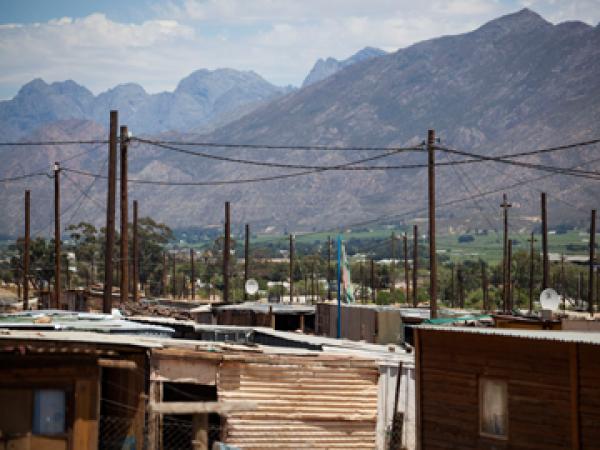

Photograph courtesy of Shachaf Polakow. www.activestills.org.
6 March 2013
Cancellation of a planned march by the farmworkers coalition against alleged intimidation by farmers has led to claims that the City of Cape Town is complicit in undermining the new R105 minimum wage.
In the backdrop of the scheduled minimum wage increase in the agricultural sector for farmworkers, a planned mass march to Parliament has been blocked by the City of Cape Town, according to the Farmworkers Strike Coalition. According to Karel Swarts of the Strike Coalition, the coalition is “devastated about the refusal to march and the decision is clearly based on politics, which we cannot accept in the new South Africa”. However, according to the Cape Times, the City claims that the coalition postponed the march on its own terms.
Organisers at a press conference held on Thursday 28 February announced a march of an expected 10 000 people planned for Saturday 2 March. The march was intended to display the strength of the farmworkers’ determination in their struggle for better living conditions and a living wage.
In another twist in the long-running saga of the farmworker strike, the scheduled increase from R69 to a R105 has been met with considerable resistance from farmers, particularly in the De Doorns and Robertson areas. Farmers claim they cannot afford the increase without significant retrenchments. Agri-SA chairperson Johannes Muller claims that, “There simply isn’t R7bn to add onto the wage bill for one year. This is good for no one – not for the farmers, not for the workers and not for South Africa”. The coalition claims that 80% of farmworkers in the De Doorns region won’t receive the scheduled wage increase.
Reports of intimidation, evictions and threats of mass dismissals have surged as the deadline for the increase approaches on March 1st. Many farmers, including those from at least fifteen farms in the De Doorns area, have applied to the Department of Labour for an exemption from the scheduled increase due to the alleged financial burden it would impose.
Farmworkers have consistently reported that farmers have pressurised them into signing contracts which waive the new R105 wage in favour of a smaller R85 wage in return for keeping their jobs. According to Jurie Scheepers, a community leader in De Doorns, many of these farmworkers are illiterate and cannot read the contracts they are signing. Farmworkers allegedly face threats of eviction, whilst others have been told they would be retrenched on Friday or the week following the wage increase.
In response to the alleged financial burden placed upon farmers, other permanent workers have received notices of eviction from farms which will come into effect from the 10 March. The coalition has urged workers to remain in their homes in defiance of these notices. The Daily Maverick has reported that farmers interviewed have claimed that no provision has been made for resettlement of evicted farmworkers.
In the Robertson area, which includes the neighbouring towns of Bonnievale, Ashton and Montagu, it appears that the Commercial Stevedoring Agricultural & Allied Workers’ Union (CSAAWU) shop stewards have been specifically targeted for retrenchments, with 49 reported as having been fired. Although as of writing there are no exact figures, the Black Agricultural Workers Union of South Africa (BAWUSA) estimates that at least 300 farmworkers in De Doorns have lost their jobs since the increase was announced on 2 February.
In a press conference at the District Six Museum, a place symbolic of forced evictions under Apartheid, Mercia Andrews of the Strike Coalition emphasized that these measures were a clear attempt to break the growing political confidence of the workers. She feels that the City of Cape Town revealed its complicity by disallowing the march.
The coalition claims that this was an obvious political intervention by the police on behalf of commercial farmers and a denial on behalf of the Democratic Alliance (DA) of the expression of the concerns of farmworkers who are already besieged. In response, the coalition has called an urgent meeting with the Minister of Labour, Mildred Oliphant, to discuss the march and the ability of the department to enforce the new minimum wage.
The City and the police claim that they cannot spare the manpower to monitor the march as they are already two scheduled marches on Saturday in Kraaifonten and Kensington in Cape Town. Refusing to call off the march entirely, the coalition has instead applied for another march, scheduled for the 23 March, in which they plan to have an even larger constituency.
The coalition views the R105 as a partial victory that must be defended at all costs. A press statement released by the coalition on the 28 February, claimed, “this is an orchestrated attack on workers’ wages that has nothing to do with the economic health of particular farms. Farmers are undermining the law and just as kragdagig as government is then they think workers are breaking the law, they are soft and supportive when the employers break the law.”
At a mass BAWUSA meeting on Sunday, a date was set for the 9 March to decide whether the strike would resume or what other course of action would be taken if the R105 is not paid and mass layoffs continue. In such a climate of fear and intimidation it would be unsurprising if the strike resumed with even more ferocity than in previous rounds.
A visibly angered farmworker told the audience at the press conference that she joined the strike not for herself but for the future of her three children who she did not want to consign to a life of manual labour and exploitation without any possibility of social mobility.
2013 marks the 100th anniversary of the 1913 Native Land Act - the first legislation passed in South Africa that limited black ownership of land. Whatever happens next, the onus is clearly on the Department of Labour to enforce their own mandated sectorial determination.